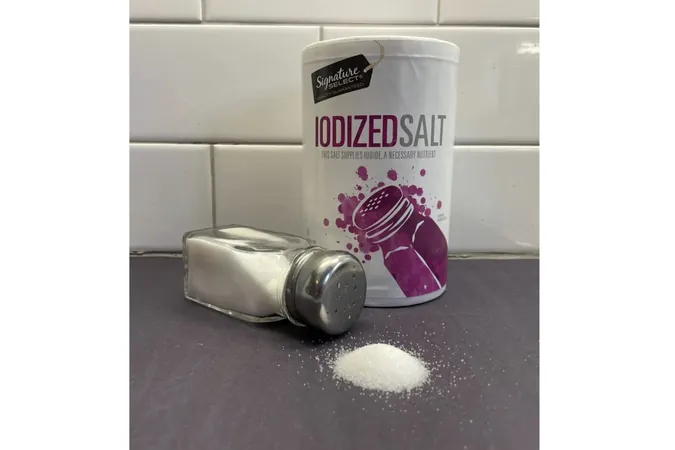
Alarming Resurgence of Iodine Deficiency: What You Need to Know Now!
2025-01-06
Author: Charlotte
In a surprising twist reminiscent of past health crises, doctors are now sounding the alarm about the return of iodine deficiency—once largely eradicated from the United States.
A recent case involving a 13-year-old boy with a rapidly swelling neck turned heads at a clinic in Providence, Rhode Island. After thorough testing, it became clear that this young patient was suffering from an iodine deficiency, a condition that was believed to be a thing of the past due to successful public health interventions.
A Brief History of Iodine: From Crisis to Success and Back Again
Iodine is a trace element vital for various bodily functions, including metabolism and brain development in children. Discovered in 1811, iodine deficiency became a significant health crisis across America until the 1920s when iodized salt was introduced as a solution. By the 1950s, over 70% of U.S. households utilized iodized salt, effectively quelling an issue that caused serious developmental problems in children, including goiters and a condition once referred to as "cretinism."
However, dietary habits have shifted dramatically. The rise of processed foods—often laden with non-iodized salt—and changing preferences toward kosher and Himalayan salts have left many unaware of their iodine intake. According to Dr. Elizabeth Pearce of Boston Medical Center and a leader in the Iodine Global Network, iodine levels among Americans have plummeted by nearly 50% since the 1970s.
Why Should You Be Concerned?
Although iodine deficiency remains uncommon for the general population, it poses a significant risk to pregnant women and young children. Medical experts, including those from the American Academy of Pediatrics, emphasize that pregnant and breastfeeding women should consume 150 micrograms of iodine daily. Yet, studies show alarming rates of deficiency—up to 25% of pregnant women in Michigan were found to be lacking sufficient iodine.
Even mild iodine deficiency has been linked to cognitive issues and language delays in children, stoking concerns among healthcare professionals about the long-term impacts on health and development.
The Silent Crisis: Are We Ignoring the Signs?
Dr. Monica Serrano-Gonzalez, who treated the aforementioned boy, noted that she and her team have encountered an uptick in iodine deficiency cases within their clinic, particularly among children with restricted diets. "We’re concerned this may be increasing, especially in patients with restricted diets," she warned.
The evolving landscape of food manufacturing, alongside a growing trend of selective eating among children, calls for urgent attention. Parents are encouraged to ensure their diets include sufficient iodine, especially through iodized salt or supplements containing the essential nutrient.
What Can You Do?
To combat this emerging health crisis, consider the following steps:
1. **Check Your Salt**: Ensure that your household uses iodized salt rather than non-iodized alternatives.
2. **Read Labels**: When purchasing multivitamins or prenatal supplements, look for those that specifically include iodine.
3. **Educate Yourself and Others**: Raise awareness about the importance of iodine and its critical role in health and development.
As we navigate through these changing dietary norms, let’s collectively take action to prevent the resurgence of iodine deficiency and protect future generations. The time to act is now—don’t let ignorance compromise your health or that of your children!









 Brasil (PT)
Brasil (PT)
 Canada (EN)
Canada (EN)
 Chile (ES)
Chile (ES)
 Česko (CS)
Česko (CS)
 대한민국 (KO)
대한민국 (KO)
 España (ES)
España (ES)
 France (FR)
France (FR)
 Hong Kong (EN)
Hong Kong (EN)
 Italia (IT)
Italia (IT)
 日本 (JA)
日本 (JA)
 Magyarország (HU)
Magyarország (HU)
 Norge (NO)
Norge (NO)
 Polska (PL)
Polska (PL)
 Schweiz (DE)
Schweiz (DE)
 Singapore (EN)
Singapore (EN)
 Sverige (SV)
Sverige (SV)
 Suomi (FI)
Suomi (FI)
 Türkiye (TR)
Türkiye (TR)
 الإمارات العربية المتحدة (AR)
الإمارات العربية المتحدة (AR)